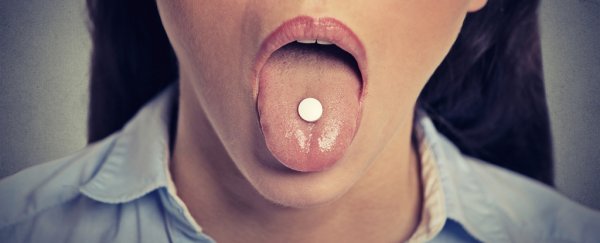Ensuring good dental hygiene isn't quite as simple as nuking all the bad bacteria in your mouth with products like anti-bacterial mouthwash, as doing so can end up harming the good bacteria that also live in our mouths.
But what if there were a more natural way of allowing the bacteria to keep itself in check? Scientists in the US have identified a new strain of mouth bacteria that might be able to keep the harmful kinds under control. They say the bugs in question – a previously unidentified strain of Streptococcus, called A12 – might even one day be available as an oral supplement, making cavity prevention as simple as swallowing a pill.
To prevent cavities and keep your teeth healthy, the environment inside your mouth needs to stay relatively neutral in terms of pH. If the mouth becomes too acidic, harmful bacteria living in it won't do your pearly whites any favours.
"At that point, bacteria on the teeth make acid and acid dissolves the teeth. It's straightforward chemistry," said oral biologist Robert Burne from the University of Florida. "We got interested in what activities keep the pH elevated."
According to the researchers, there are two main compounds that help neutralise acid in the mouth, heading off cavities before they start. These are urea, which everybody secretes in their mouths, and arginine, an amino acid.
Previous research by Burne and colleagues had found that arginine was more easily broken down in the mouths of people with few or no cavities, suggesting that bacteria in these people's mouths were helping to keep them chemically neutral. But which type of bacteria was it?
The new findings, published in Applied and Environmental Microbiology, indicate that A12 – the newly discovered strain of Streptococcus bacteria – is the bacteria they've been looking for, and if scientists can figure out how to package it into a form we could ingest, it could turn out to be a way to prevent cavities before they begin.
"Like a probiotic approach to the gut to promote health, what if a probiotic formulation could be developed from natural beneficial bacteria from humans who had a very high capacity to break down arginine?" said Burne.
"You would implant this probiotic in a healthy child or adult who might be at risk for developing cavities. However many times you have to do that – once in a lifetime or once a week, the idea is that you could prevent a decline in oral health by populating the patient with natural beneficial organisms."
A12's ability to protect our mouths comes in two ways. Not only does it neutralise acid by metabolising arginine, but the bacterium also attacks Streptococcus mutans, a harmful strain of bacteria that metabolises sugar into lactic acid, contributing to cavities.
"Also, if A12 doesn't kill Streptococcus mutans, A12 interferes with Streptococcus mutans' ability to carry out its normal processes that it needs to cause disease," said Burne. "If you grow them together, Streptococcus mutans does not grow very well or make biofilms, also known as dental plaque, properly."
To find A12, the scientists isolated more than 2,000 types of bacteria from plaque samples. Of these, 54 metabolised arginine, and A12 stood out as the most powerful and promising with regards to its potential as a probiotic application.
While an oral supplement is the ultimate goal, the researchers say in the meantime what they've found out about A12 could help them develop a clinical technique to screen people at risk of developing cavities.
"We may be able to use this as a risk assessment tool," said one of the team, Marcelle Nascimento. "If we get to the point where we can confirm that people who have more of this healthy type of bacteria in the mouth are at lower risk of cavities … this could be one of the factors that you measure for cavities risk."
